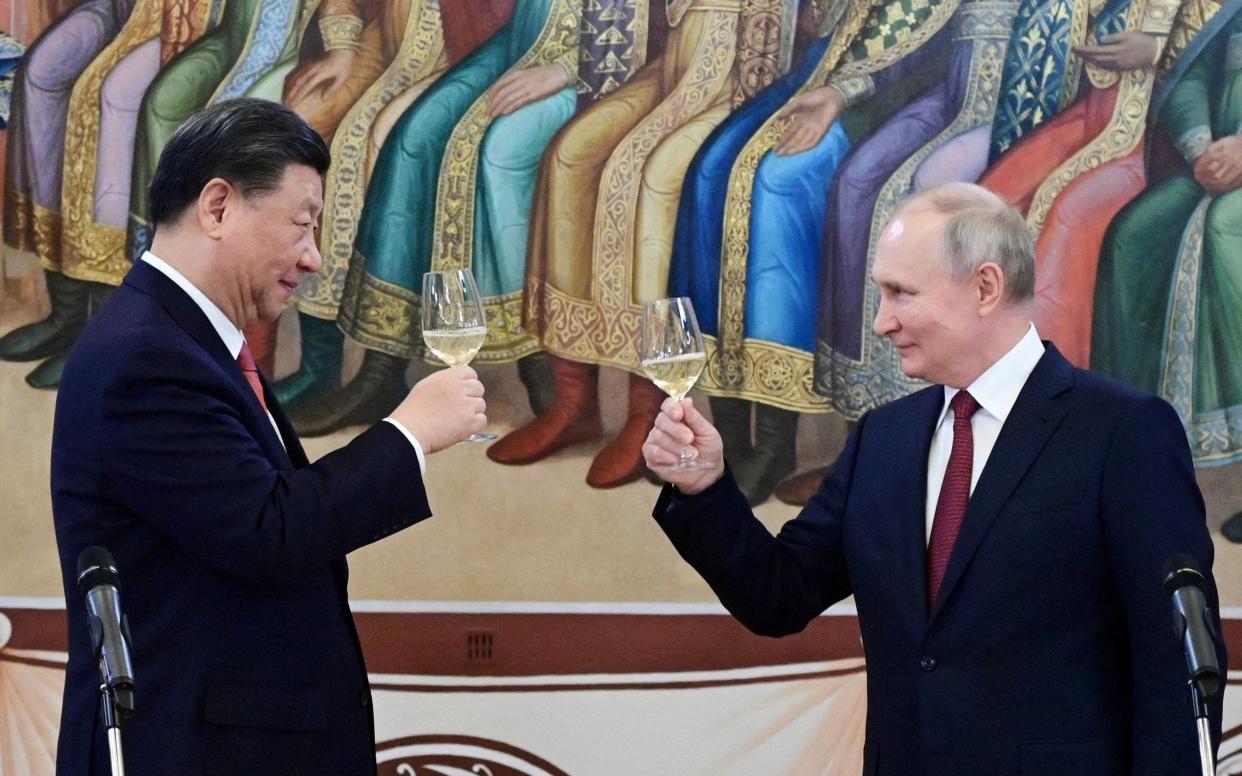Xi and Putin are building a new axis of evil

- Oops!Something went wrong.Please try again later.
- Oops!Something went wrong.Please try again later.
- Oops!Something went wrong.Please try again later.
The paradox of diplomatic revolutions is that the communiques announcing them are usually bland. Yesterday, after two days of talks between Vladimir Putin and Xi Jinping, Russia and China endorsed the principles of the UN Charter, peace, dialogue, and so on. Some Western observers have taken comfort from the fact that the official record did not reveal any explicit plans for world domination, as if it was ever likely to.
They should ask instead what lies behind the facade of soporific banalities, the boilerplate copy which any reasonable person would endorse but any intelligent person would find suspiciously hollow. History provides us with plentiful examples of diplomats speaking empty words of peace while more cynical agreements are drawn up behind closed doors, and in particular examples within the Kremlin itself.
On August 23 1939, Adolf Hitler’s foreign minister Joachim von Ribbentrop signed a banal agreement with Stalin’s foreign minister Vyacheslav Molotov, declaring to the world that neither country would go to war with the other. The more important parts of the deal were sealed away in secret protocols which laid out the two countries spheres of influence and plans for the partition of Eastern Europe. What happened yesterday should once again set alarm bells ringing in the West.
The balance of power between the free world and the new China-Russia axis is much more favourable to the enemies of democratic liberalism than the balance between the allies and axis in 1939, and we know how dangerous the uncoordinated efforts of Germany, Italy and Japan proved then. The West needs to coordinate its response to this serious new threat.
Set to one side China’s recent dramatic assertion of influence in the oil-rich Middle East, where Beijing has been the patron of a dramatic rapprochement between Saudi Arabia and Iran after decades of mortal rivalry. Ignore for now also Russia and China’s joint influence operations across Africa.
The West faces a crisis on two fronts; Putin’s war in Ukraine, and China’s own regional ambitions ten time zones east. The Beijing-Moscow axis, meanwhile, sees us as a single target. Putin has conceded leadership to Xi because he cannot survive defeat in Ukraine, but is still fighting what we might call “World War Z”. This is a global Russo-Chinese hybrid mix of a localised violent conflict added to worldwide economic competition for resources and markets along with ideological rejection of Western democracy.
Only Japan’s premier, Fumio Kishida, seems to understand this global dimension. Visiting Kyiv on the day Xi and Putin conferred in Moscow, Kishida clearly sees a clear link between Japan’s security and Europe’s concerns about a Russo-Chinese Eurasian bloc.
It is a sad reality that only Russia, China and Japan appear to see the current crisis globally. In the West, each state seems focused on a regional angle. Europeans see Russia overwhelmingly as the main problem. Americans are squabbling as to whether Russia or China is their real rival. Britain wants to play a global role but our armed forces are woefully underfunded for it. Western partners need to learn from China and Russia how to coordinate before it is too late.

